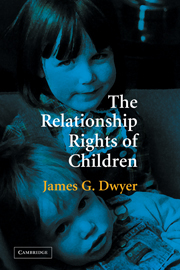Book contents
- Frontmatter
- Contents
- Acknowledgments
- THE RELATIONSHIP RIGHTS OF CHILDREN
- Introduction
- 1 Why Rights for Children?
- 2 The Existing Relationship Rights of Children
- 3 Paradigmatic Relationship Rights
- 4 Why Adults Have the Relationship Rights They Do
- 5 Extending the Theoretical Underpinnings of Relationship Rights to Children
- 6 Rebutting Defenses of the Status Quo
- 7 Implementing Children's Moral Rights in Law
- 8 Applications
- Appendix: The Conceptual Possibility of Children Having Rights
- Notes
- Index
4 - Why Adults Have the Relationship Rights They Do
Published online by Cambridge University Press: 23 July 2009
- Frontmatter
- Contents
- Acknowledgments
- THE RELATIONSHIP RIGHTS OF CHILDREN
- Introduction
- 1 Why Rights for Children?
- 2 The Existing Relationship Rights of Children
- 3 Paradigmatic Relationship Rights
- 4 Why Adults Have the Relationship Rights They Do
- 5 Extending the Theoretical Underpinnings of Relationship Rights to Children
- 6 Rebutting Defenses of the Status Quo
- 7 Implementing Children's Moral Rights in Law
- 8 Applications
- Appendix: The Conceptual Possibility of Children Having Rights
- Notes
- Index
Summary
Why do we competent adults have the powerful legal relationship rights described in Chapter 3? Why does the state not limit to a greater extent our freedom to enter into and get out of personal relationships – whether friendships, association with our parents or siblings, or intimate partnerships? Why are other people not permitted to force their association upon us? Why do we not have state-arranged marriages and state-arranged relationships of every other sort? Or why are other private citizens not empowered to decide with whom we may or must have relationships?
Answering these questions leads us into the moral justifications for rights to freedom in general as well as into special justifications for the particular right to freedom of intimate association. To some degree, a right against interference with our chosen personal associations is a derivative right, one specific extension of the core general right against interference with pursuit of our chosen aims. But there are also reasons for according a right of freedom of intimate association that are particular to that aspect of human life. The more prominent traditions in modern political philosophy have had much to say about freedom in general, but not so much about freedom of intimate association in particular, so developing a solid understanding of the normative foundation of that particular freedom requires some extension of existing arguments into a new realm.
- Type
- Chapter
- Information
- The Relationship Rights of Children , pp. 95 - 122Publisher: Cambridge University PressPrint publication year: 2006

